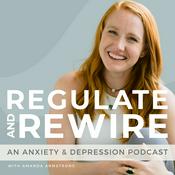When the world feels like it's falling apart, how do we stay connected to ourselves while still showing up for what matters? In this episode, we're talking about collective trauma, what it actually means to be "regulated" (hint: it doesn't mean calm), and the tangible nervous system tools that can help you stay resourced during ongoing crisis. This isn't about fixing everything—it's about staying grounded enough to keep going.
In this episode, you'll learn:
What collective and vicarious trauma actually are, and how your nervous system processes witnessing suffering even through a screen
Why "regulated" doesn't mean calm—and what regulated activism actually looks like in practice
The neuroscience behind tools like predictability, warmth, and nostalgia as primitive safety signals for your nervous system
Why "tangible help kills the helplessness" and how micro-acts of care keep you connected and resourced
How to practice dialectical thinking: holding both the horror and the helpers at the same time
3 Takeaways:
Regulated doesn't mean calm—it means connected. You can be furious, heartbroken, and activated AND still be regulated. Regulation is about staying connected to your body, your breath, and your capacity to respond (not just react) while you feel all the feelings and fight for what matters.
Tangible help kills the helplessness. When everything feels too big and overwhelming, do something small and real. Drop off coffee for a neighbor. Text a friend "thinking of you." Bake bread and share it. These micro-acts of care aren't trivial—they're how we stay connected and resourced enough to keep going.
Look for the helpers—it's neuroscience, not toxic positivity. Witnessing acts of courage, kindness, and resistance activates your vagus nerve and counters compassion fatigue. Your nervous system needs evidence that while the monster is real, the protector is active too. Practice dialectical thinking: horrifying things are happening AND people are showing up for each other. Both are true.
Resources mentioned:
CLICK HERE to join my monthly release class. Use the code "REGULATE" for 100% off.
CLICK HERE to get 10% off my favorite phone boundary support (BRICK)
Post from @meghanbreentherapy
—
Looking for more personalized support?
Book a FREE discovery call for RESTORE, our 1:1 anxiety & depression coaching program (HSA/FSA eligible & includes comprehensive bloodwork)
Join me inside Regulated Living, a mental health membership and nervous system healing space (sliding scale pricing available)
Order my book, Healing Through the Vagus Nerve today!
*Want me to talk about something specific on the podcast? Let me know HERE.
Website: https://www.regulatedliving.com/podcast
Email:
[email protected]Instagram: @amandaontherise
TikTok: https://www.tiktok.com/@amandaontherise



